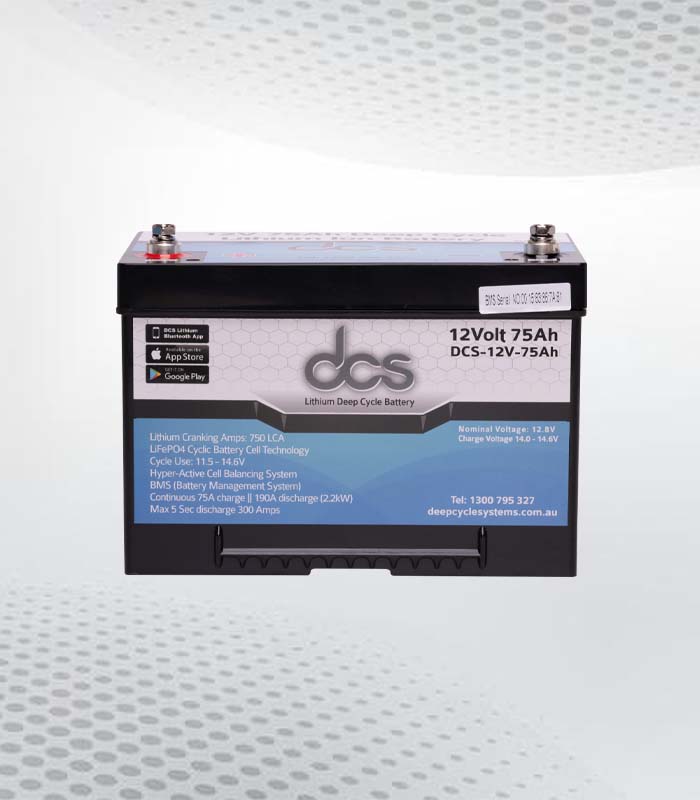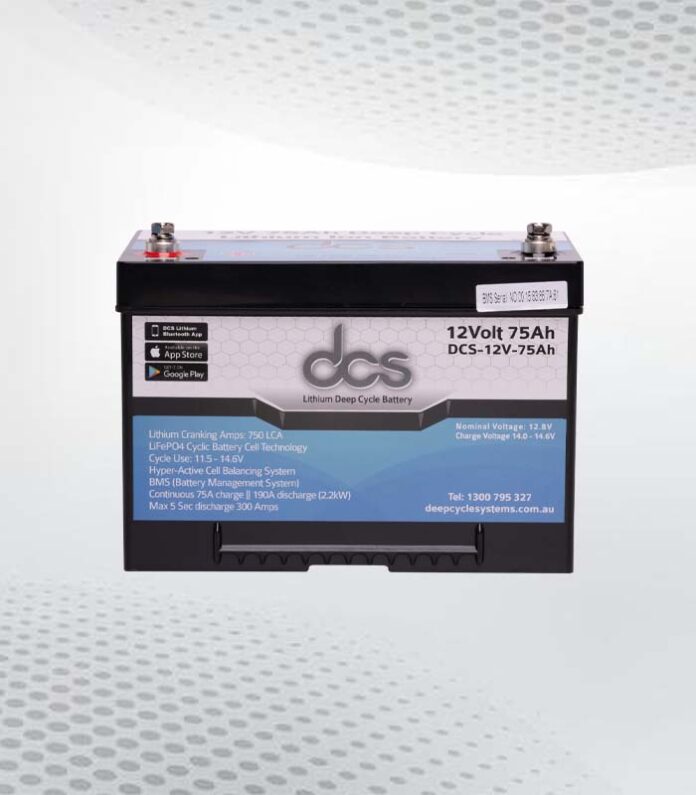In a world that’s increasingly reliant on portable and sustainable power solutions, the quest for reliable energy storage is more critical than ever. As we steer towards greener pastures with renewable energy systems and the demand for robust power sources in recreational vehicles (RVs) and marine applications grows, the spotlight turns to deep cycle battery lithium. Known for its long-lasting performance and exceptional durability, this battery is a testament to modern engineering and innovation.
Understanding Deep-Cycle Lithium Batteries and Their Advantages
Deep-cycle lithium batteries provide dependable power across numerous cycles, setting them apart from traditional power storage options. Their design allows for deep discharges without significant loss in capacity, ensuring a consistent energy supply. This capability is enhanced by their rapid recharge rates and extended operational lifespan, characteristics that lead to fewer replacements and a reduction in long-term costs.
Additionally, these batteries boast a superior energy density, offering a more compact and lightweight solution than their lead-acid counterparts. This advantage is not just about saving space; it’s about optimizing efficiency and portability, especially in applications where weight and volume are critical constraints.
The environmental benefits also stand out, as these batteries do not contain the toxic lead found in traditional batteries, and their longer life means less waste. These attributes underscore the significant advantages of deep-cycle lithium batteries, making them a preferred choice for those prioritizing sustainability, efficiency, and reliability in their energy storage solutions.
The Role of Lithium Deep Cycle Battery in Renewable Energy Systems
Integrating deep-cycle lithium batteries into renewable energy systems marks a significant advancement in our pursuit of sustainable power solutions. These systems, whether based on solar, wind, or hydropower, rely heavily on efficient and reliable energy storage to manage the intermittency of renewable resources. Deep-cycle lithium batteries excel in this role, offering the capacity to store large amounts of energy generated during peak production times for later use, effectively bridging the gap between generation and demand. One of the key contributions of lithium batteries to renewable energy systems is their ability to provide stable power output over extended periods.
This stability is crucial for maintaining the balance of grid systems and ensuring that renewable energy sources can be relied upon just as much as traditional fossil fuels. The rapid charge times of lithium batteries complement renewable energy production profiles, allowing for quicker energy turnover, which is particularly advantageous during periods of high production and low consumption.
Moreover, the scalability of lithium deep cycle battery systems means that they can be easily expanded to meet growing energy demands or to increase storage capacity as renewable energy projects scale up. This adaptability makes them suitable not only for utility-scale energy storage and smaller, off-grid systems that provide power to remote areas or individual homes, further democratizing access to sustainable energy. In renewable energy systems, the environmental and efficiency advantages of lithium technology also come to the forefront.
By maximizing the use of generated renewable energy and reducing reliance on carbon-emitting backup systems, deep-cycle lithium batteries significantly reduce overall carbon footprints, aligning with the global movement towards a more sustainable and cleaner energy future.
Maximizing Mobility: Deep-Cycle Lithium Batteries in RVs and Marine Applications
The advent of deep-cycle lithium batteries has revolutionized the way we think about power on the move. For enthusiasts of recreational vehicles (RVs) and lovers of marine adventures, these batteries offer a blend of efficiency, durability, and lightweight design that’s hard to match. Their high energy density means that users can enjoy longer periods of off-grid power without the bulk and weight that come with traditional battery options.
This is especially critical in scenarios where every ounce matters, such as in compact RV spaces or on boats where additional weight can impact fuel efficiency and maneuverability. In the context of RVs, deep-cycle lithium batteries empower travellers with the freedom to explore remote locations without the constant worry of finding the next charging station. The batteries’ ability to discharge deeply without damaging their long-term capacity ensures that lights stay on and essential devices remain operational throughout the journey.
Similarly, for marine applications, these batteries provide reliable and steady power for navigation systems, communication devices, and safety equipment, even in the most demanding sea conditions. The robust nature of deep-cycle lithium batteries also means they are well suited to the vibrations and shocks common in mobile environments.
Whether navigating bumpy roads in an RV or facing turbulent waves at sea, these batteries maintain their integrity and deliver consistent power. This reliability adds to the comfort and safety of mobile living and marine voyages and significantly reduces maintenance concerns, allowing adventurers to focus on the experience rather than the upkeep of their power source.
The Unmatched Durability and Longevity of Deep Cycle Lithium Battery
In energy storage, deep-cycle lithium batteries distinctly separate themselves due to their extraordinary durability and longevity. These specialized batteries are constructed to endure several thousand charging and discharging cycles, substantially outperforming the average lifespan of traditional lead-acid batteries. One key attribute of their durability is their capability to retain substantial energy storage capacity over numerous years of utilization, experiencing minimal deterioration. This sturdy attribute is partly credited to the resilient nature of lithium, which remains unaffected by the damaging wear and tear mechanisms that impact other types of batteries.
The superior construction quality of deep cycle lithium battery bolsters its ability to resist physical stresses, including vibrations and impacts. These stress factors are especially common in mobile applications such as Recreational Vehicles (RVs) and marine settings, requiring a reliable and sturdy power source. The strength of these batteries allows for sustained power provision over extended periods and consistent performance regardless of variable conditions.
The need for recurrent replacements diminishes with their use, as their longevity ensures sustained power output. This sustained reliability, coupled with the fact that they maintain high energy capacity even after many years, makes them a worthwhile investment in long-term cost-effectiveness. Their unique properties contribute to their high overall value, making them a profitable investment for users requiring durable and resilient energy storage solutions, to the overall value and cost-effectiveness of the investment in lithium battery technology.
Navigating the Initial Investment: Understanding Cost Versus Value
When considering the switch to deep-cycle lithium batteries, the upfront cost can appear daunting to many. It’s no secret that lithium batteries command a higher initial investment compared to traditional lead-acid batteries. However, evaluating this cost requires a broader perspective that factors in the total value offered over the battery’s lifespan.
The true cost-effectiveness of deep-cycle lithium batteries emerges when considering their extended service life, minimal maintenance requirements, and consistent performance. The longevity of lithium batteries means that, over time, the cost per cycle is significantly lower than that of lead-acid batteries. This is a critical consideration for systems requiring reliable power over an extended period, such as renewable energy installations, RVs, and marine vessels.
Additionally, the efficiency of lithium batteries in energy storage and discharge leads to savings on energy costs, as more of the stored energy is usable compared to lead-acid batteries, which suffer from Peukert’s effect and lower Depth of Discharge (DoD) capabilities. The reduced maintenance and replacement costs further tilt the balance in favour of lithium batteries.
The operational costs are lower without regular upkeep like watering, equalizing charges, or dealing with sulphation. Their ability to maintain a higher capacity for a more extended period reduces the frequency of battery replacements, contributing to cost savings and environmental sustainability.
Making the Switch to Deep-Cycle Lithium Batteries: What You Need to Know
Transitioning to deep-cycle lithium batteries signifies a step forward in maximizing the efficiency and reliability of your energy storage system. Before making the switch, it’s crucial to consider compatibility with your existing setup. These batteries often require a specific type of charger that can properly manage their charge cycle, ensuring safety and optimizing longevity.
Additionally, the battery management system (BMS) is an essential component of lithium batteries, designed to protect against overcharging, deep discharge, and overheating, which could otherwise compromise battery life and performance. Understanding your energy requirements is also key. Evaluate your current and anticipated power usage to select a battery capacity that meets your needs without oversizing, which can unnecessarily elevate costs. It’s equally important to consider the installation environment, as lithium batteries perform best within certain temperature ranges.
However, advanced models with built-in temperature controls are available for extreme conditions. Consultation with professionals can provide valuable insights, helping identify potential hurdles in your transition to lithium technology. They can offer guidance on the most suitable configurations for your specific applications, whether for a renewable energy system, an RV, or marine use—lastly, factor in the responsible disposal of your old batteries.
Recycling programs for lead-acid batteries are widely available and ensure that harmful materials are not released into the environment. Transitioning to lithium batteries enhances your energy system’s efficiency and reliability and contributes to a more sustainable approach to power management.
As you embark on this switch, thorough preparation and understanding of these considerations will pave the way for a smooth and successful integration of deep-cycle lithium batteries into your energy storage solution.
 FAQs
FAQs
1. What is the typical lifespan of deep cycle battery lithium?
Deep-cycle lithium batteries boast a remarkable lifespan, often exceeding 2000 charge cycles while maintaining up to 80% of their original capacity. Under ideal conditions, this can equate too many years of dependable service, significantly outperforming alternatives.
2. Can deep-cycle lithium batteries operate efficiently in colder climates?
While lithium batteries can experience reduced efficiency in extreme cold, certain models have built-in temperature management systems. Also, insulated enclosures can help preserve battery efficiency in cold environments, ensuring consistent performance.
3. How do deep-cycle lithium batteries impact the environment compared to traditional options?
These batteries present a greener alternative by lasting longer and avoiding the use of toxic heavy metals, such as lead, found in traditional batteries. Their extended lifespan and absence of harmful components contribute to a reduced environmental footprint throughout their use.
Conclusion
Embracing deep-cycle lithium batteries is more than choosing a power source; it’s an investment in future-proofing energy needs across various domains. Their resilience, combined with superior performance and efficiency, positions these batteries as a cornerstone for those aiming for sustainability without compromising reliability. For renewable energy systems, recreational vehicles, and marine applications, the transition to lithium technology means enhanced operational effectiveness and a significant step towards reducing environmental impact. The journey towards a greener and more efficient energy landscape is paved with innovations like deep-cycle lithium batteries, driving us towards a world where sustainable power is not only accessible but also dependable. As we chart this course, the benefits of lithium batteries—longevity, eco-friendliness, and cost-effectiveness—underline the importance of adopting advanced energy storage solutions that align with our evolving power requirements.
| Other Good Articles to Read |
| Blogs-Nation |
| Blogs-Peoples |
| Bryan Smith Blogs |
| intellect blogs |
| the fault in our blogs |
| blogs eu |
| oz forums |
| recruitment blogs |
| zet blogs |
| id blogs |
| Blog Studio legale |
| blogs map |
| Related Business Listings |
| Contact Directory |
| Local Business Profiles |
